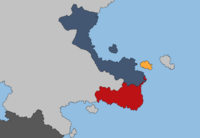Labradoria: Difference between revisions
No edit summary |
No edit summary |
||
| Line 2: | Line 2: | ||
|native_name = <!-- Name in a modern syntax of native language(s). Leave blank if name is only in English. | |native_name = <!-- Name in a modern syntax of native language(s). Leave blank if name is only in English. | ||
Separate with line breaks<br/> or use Template:Plainlist. If language uses Latin characters, place name(s) in italics. --> | Separate with line breaks<br/> or use Template:Plainlist. If language uses Latin characters, place name(s) in italics. --> | ||
|conventional_long_name = <!-- Full name in English --> | |conventional_long_name = <!-- Full name in English --> Unitary Kingdom of Labradoria | ||
|common_name = <!-- Name to be used in constructing links and category names; not for display -->Labradoria | |common_name = <!-- Name to be used in constructing links and category names; not for display -->Labradoria | ||
|iso3166code = omit <!-- For a country or geopolitical version of a country that ceased to exist prior to the introduction of iso3166--> | |iso3166code = omit <!-- For a country or geopolitical version of a country that ceased to exist prior to the introduction of iso3166--> | ||
Revision as of 22:09, 21 August 2021
Unitary Kingdom of Labradoria | |
|---|---|
| 1629–1819 | |
|
Flag | |
 Labradoria in 1810, indicated in red. | |
| Capital | Eastminster Rhodeport |
| Common languages | Anglish and Variot |
| Demonym(s) | Labradorian |
| Government | Republic |
| Monarch | |
• 1704-1725 | William I |
• 1725-1756 | William II |
• 1756-1762 | Anne |
• 1762-1770 | William III |
• 1770-1800 | Frederick I |
• 1800-1819 | William IV |
| Governor-General | |
• 1769-1782 | Henry Beaumont |
• 1782-1795 | Charles Landstadt |
• 1795-1815 | George Morris |
• 1815-1819 | Martin Von Bertricht |
| Legislature | Continental Assembly |
| House of Governors | |
| House of Delegates | |
| History | |
• Establishment of the Colony of Delamaria | 1629 |
• | Crown Colony of Great Anglia |
• 1679 | Royal Dominion of Great Anglia |
• 1704 | Independence Declared from Great Anglia |
• Joined the 2nd Federation of Delamaria | 1 January 1819 |
| Currency | Labradorian Pound |
| Today part of | Delamaria |
| |
The Unitary Kingdom of Labradoria was a country located in Southern Delamaria from 1766 to 1819, when it formed the Federation of Delamaria with Lysian Columbia. The nation was a constitutional monarchy under the House of Bohun-Odell, a cadet branch of the House of Odell, which ruled with 6 monarchs from 1704 to 1819.
Prior to its independence Labradoria was a Royal Dominion of Great Anglia, with a hereditary Vice Roy as its leader, which would initially be appointed by the Anglian monarch, the first Vice Roy was William Bohun-Odell, the nephew of the Anglian Monarch through his sister. In 1766 an independent Unitary Kingdom was declared with the Bohun-Odells as its ruling house, this lead to Anglian loyal soldiers stationed at Fort Meyer attempting to seize power by taking the political and military leaders meeting in Felderling hostage, with an illequipped force left without leadership failing to take control of Beaumont Palace where the hostages were being kept, an appeal was sent to local militias to help break through the defencive structures built around the palace, the largest militia nearby was the Vandergart Republican Army, lead by Charles Landstadt. Landtstadt succesfully broke into the Palace and rescued the hostages with minimal casualties, an order was sent to kill the hostages only minutes prior to their rescue, though the soldiers guarding them were afraid they would be later tried for doing so. After this many republican sentiments were still prevolent, despite the republican leadership working with the monarchists. A major republican faction known as the Pan-Delamaric Republican Party had thousands of members and threatened to overthrow the new monarchy. Therefore in 1670, only months after his coronation, King Frederick I issued the Democratic Proclomation, granting major powers to the Governor-General, and expanding voting rights to most men and some upper class women. The Proclomation also significantly decreased the powers of the nobility, rendering their positions to mere titles, without any real control over the lands within their domains.
